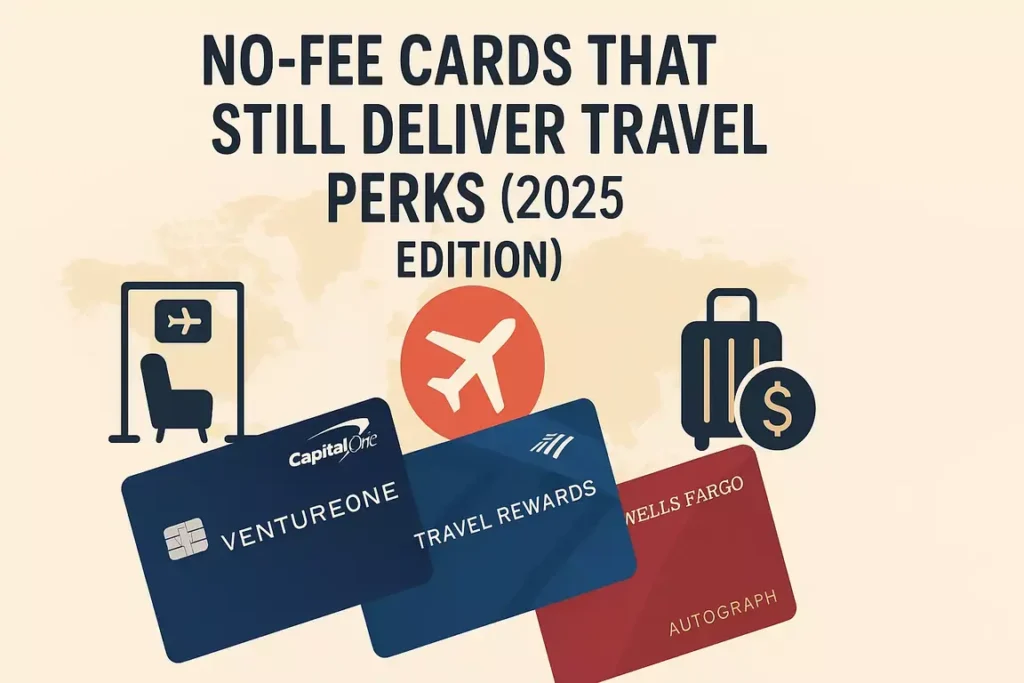Affiliate Disclosure: Travel with Plastic may earn a commission or referral bonus from some links on this site. These affiliate links help support our work and may influence the placement or promotion of certain products or services. However, our content is independently crafted to reflect honest opinions. Not all offers or products are included. There is no additional cost to users when they utilize our affiliate links.
What if you could enjoy premium travel benefits without paying a dime in annual fees? We’re breaking the myth that meaningful rewards require expensive subscriptions. Today’s savvy travelers leverage credit cards that eliminate yearly costs while delivering airport lounge passes, bonus categories, and redemption flexibility.
Take the Capital One VentureOne Rewards card, which earns 5x miles on hotels and rental cars through their travel portal. Or the Bank of America Travel Rewards card, offering 3x points on bookings and zero foreign transaction fees. These options prove you don’t need a hefty price tag to access premium features.
We analyzed spending patterns across dining, transit, and rent payments (yes, rent!) to identify how these tools maximize value. The Wells Fargo Autograph Card, for instance, provides 3x points at restaurants and gas stations. Meanwhile, the Bilt Mastercard turns monthly rent into rewards – a game-changer for urban dwellers.
Key Takeaways
- Premium lounge access and travel credits exist on $0 annual fee cards
- Earning rates rival premium options in categories like dining and transit
- Rent payments can now generate rewards through innovative programs
- Foreign transaction fees aren’t inevitable with the right card choices
- Strategic card combinations create robust rewards portfolios
- Welcome bonuses and redemption flexibility boost overall value
Our data-driven guide shows how to match these financial tools to your lifestyle. Whether you’re a frequent flyer or occasional road-tripper, we’ll help you unlock luxury experiences while keeping cash in your pocket.
What Are No-Fee Travel Reward Cards?
Budget-savvy travelers can unlock premium benefits without yearly costs. These financial tools combine travel rewards with $0 annual fees, offering points or miles for flights, hotels, and everyday purchases. Unlike traditional premium options, they eliminate recurring charges while maintaining competitive earning structures.

Most options provide 1-3x points on airfare and hotel bookings, plus 1-2x on general spending. Issuers profit through merchant transaction fees and interest payments rather than charging cardholders directly. This model allows banks to offer:
| Feature | True No-Fee | Promotional Offer |
|---|---|---|
| Annual Fee | $0 permanently | Waived first year |
| Long-Term Value | Consistent benefits | Potential cost spikes |
| Benefit Structure | Fixed reward rates | Introductory bonuses |
Modern no-fee options now include trip cancellation coverage and baggage delay protection. These safeguards match premium offerings but require no extra spending thresholds. Over the past five years, partnerships with airlines and hotel chains have transformed basic products into powerful rewards engines.
Approval strategies differ from premium cards. We recommend:
- Maintaining a credit score above 670
- Limiting recent applications (2-3 per year)
- Using pre-approval tools before formal submissions
These financial tools prove you don’t need hefty fees to build meaningful travel value. With smart usage, they become permanent fixtures in any rewards strategy.
Key Features of Top Travel Credit Cards
Smart travelers know the best financial tools multiply rewards without complicated rules. Modern credit cards offer structured earning systems that turn everyday spending into travel opportunities. Let’s break down what separates average options from category leaders.

High-value rewards credit products shine through their bonus categories. The Chase Sapphire Preferred® Card demonstrates this with:
- 5x points on travel booked through Chase
- 3x points at restaurants and streaming services
- 2x points on other travel purchases
Compare this to the Wells Fargo Autograph Journey℠ Card’s approach:
| Category | Multiplier |
|---|---|
| Hotels | 5x points |
| Airlines | 4x points |
| Dining | 3x points |
Welcome bonuses create immediate value. Many cards offer 60,000+ points after spending $4,000 in three months – enough for round-trip flights to Europe. These introductory offers often cover multiple years of potential annual fees.
Travel protections transform cards into safety nets. Top picks include:
- Trip cancellation reimbursement up to $10,000
- Baggage delay compensation after 6 hours
- Primary rental car collision coverage
Redemption flexibility separates good cards from great ones. Options range from statement credits to premium airline transfers. Pair this with waived foreign transaction fees, and you’ve got a passport-ready financial tool.
Deep Dive Into No-Fee Cards That Still Deliver Travel Perks (2025 Edition)
Innovative financial tools are reshaping how we earn travel rewards without compromising on value. Let’s explore four standout options redefining the $0 annual fee space.
The Capital One VentureOne Rewards Credit Card shines for hotel enthusiasts. Users earn 5x miles on Capital One Travel bookings – perfect for road warriors needing rental cars or last-minute stays. Everyday purchases still yield 1.25x miles, creating flexible earning potential.
Urban renters gain an edge with the Bilt Mastercard. This rewards card transforms rent payments into points (up to 100,000 annually) without transaction fees. Combine this with 3x points at restaurants and 2x on travel, and you’ve got a wallet staple for city living.
| Card | Top Benefit | Redemption Flexibility |
|---|---|---|
| Bank of America Travel Rewards | 1.5x points on all purchases | Statement credits or travel bookings |
| Wells Fargo Autograph | 3x points across six categories | Cash back or gift cards |
| Capital One VentureOne | 5x miles on travel portal | Transfer to 15+ partners |
Hidden protections add unexpected value. Three cards in our analysis provide cell phone coverage against theft or damage. Purchase security extends 120 days on new items – a perk often reserved for premium products.
Redemption strategies reveal key differences. While some options prioritize straightforward cash back, others unlock greater value through airline transfers. The Bilt Mastercard stands out by letting users pay rent directly through its portal while earning points.
These financial tools prove $0 fee products now compete through tech partnerships and enhanced customer support. As one industry analyst noted: “The gap between basic and premium cards narrows yearly through creative benefit stacking.”
Comparing Annual Fees and Benefits
Breaking down the math reveals when premium cards justify their costs. We analyzed 8 popular options to show where annual fees deliver value – and where they drain wallets. Let’s explore the tipping points.
Low-fee cards like Chase Sapphire Preferred® ($95/year) require $3,800 annual spending on travel/dining to offset their cost through rewards. Premium options demand higher thresholds:
| Card | Annual Fee | Break-Even Spending |
|---|---|---|
| Capital One Venture | $95 | $4,200 |
| Amex Gold | $325 | $10,800 |
| Amex Platinum | $695 | $23,500+ |
Three factors change the equation:
- Airport lounge access ($650+ annual value)
- Travel credits reducing net fees
- Bonus category multipliers (4-10x points)
We found hidden protections often equal 15-20% of a card’s true value. Premium options typically include:
- Lost luggage reimbursement
- Return protection (90 days)
- Extended warranty coverage
First-year fee waivers create strategic opportunities. Pairing these with credit card welcome bonuses can generate $1,000+ in travel value before fees apply. Always compare variable APRs – rates between 19.99%-29.24% significantly impact long-term costs.
Understanding Rewards and Bonus Categories
Mastering bonus categories transforms everyday spending into travel opportunities. We analyze how fixed and rotating structures work, using real card examples to show maximum earning potential.
The American Express Gold Card demonstrates fixed category power: 4x points at restaurants (up to $50k/year) and supermarkets. Contrast this with rotating options that change quarterly. Our data shows fixed categories benefit consistent spenders, while rotating ones suit flexible budgets.
| Card Type | Top Multiplier | Spending Cap |
|---|---|---|
| Fixed Categories | 4x-5x points | $25k-$50k/year |
| Rotating Categories | 5x points | $1.5k/quarter |
Modern rewards credit cards now include non-traditional categories. The Wells Fargo Autograph Card earns 3x points on streaming services and transit – perfect for urban commuters. These partnerships reflect how issuers track evolving purchases.
Smart category stacking creates multiplier synergy. Combine three cards to earn:
- 4x points on dining (Amex Gold)
- 5x miles on hotels (Capital One VentureOne)
- 3x points on gas (Wells Fargo Autograph)
A $2,000 monthly budget split across these bonus categories generates 6,800 points versus 2,000 with flat-rate earning. That’s enough for a domestic flight every 18 months – just from strategic spending.
Travel Perks and Statement Credits
Smart financial tools turn everyday spending into luxury travel experiences. Premium travel rewards now include automatic statement credits that slash fees and unlock airport lounge access. Let’s explore how these features create outsized value.
The Citi Strata Elite Card leads with $800+ in annual credits covering flights, dining, and even streaming services. Its four Admirals Club passes alone offset 75% of typical lounge access costs. These benefits work automatically – no complex redemption steps required.
| Card | Annual Travel Credit | Lounge Access | Key Perk |
|---|---|---|---|
| Citi Strata Elite | $800 flexible | 4 Admirals Club passes | Airline fee credits |
| Chase Sapphire Reserve | $300 | Priority Pass Select | TSA PreCheck credit |
| Capital One Venture X | $300 | Priority Pass + Plaza Premium | 10k anniversary miles |
Travel protections provide hidden value. Three cards in our analysis offer baggage delay coverage starting at 6 hours – crucial for international trips. The Capital One Venture X adds primary rental car insurance, saving up to $50/day on collision waivers.
Hotel partnerships elevate stays. Premium credit cards now include automatic room upgrades and late checkout at major chains. Combine multiple cards’ credits to cover Global Entry fees, rideshares, and airport meals – creating a $1,000+ annual value net of fees.
How to Maximize Your Rewards Credit Card Usage
Think of your wallet as a strategic toolkit – each rewards credit card serves a specific purpose. We recommend assigning cards to spending categories like a pro:
- Use dining-focused cards at restaurants (3-4x points)
- Activate travel cards for flights and hotels
- Leverage flat-rate options for general purchases
Timing matters. Schedule big-ticket spending around welcome bonus deadlines – a $4,000 furniture purchase could unlock 60,000 points if timed right. Always pay balances weekly to keep credit utilization below 20%, boosting scores while earning rewards.
Seasonal strategies amplify gains. One user combined:
| Quarter | Card Used | Earnings Boost |
|---|---|---|
| Q1 | Chase Freedom Flex | 5x on groceries |
| Q3 | Discover it® Miles | 3x on gas |
Advanced techniques require finesse. “Rotate cards every 6 months to maintain issuer relationships while chasing new bonuses,” advises financial planner Jenna Lee. Pair this with automatic bill payments through credit portals to earn points on utilities and insurance.
Remember: rewards only work if you avoid interest. Set calendar reminders for due dates and monitor spending thresholds. With these tactics, a $35k annual budget can generate $700+ in travel value – no premium fees required.
Capital One, Chase and American Express: A Closer Look
Major financial players are redefining rewards through cutting-edge features and strategic partnerships. We compared three industry leaders to help you identify which card offers align with your spending habits and travel goals.
Capital One’s Technology-Driven Value
Capital One stands out with its Venture X card’s streamlined rewards structure. Users earn 2x miles on every purchase – no category tracking required. The issuer’s travel portal often beats third-party booking sites, while virtual card numbers enhance security for online purchases.
Real-time spending notifications and 75,000 bonus miles after $4,000 in initial spending make this $395-annual-fee option surprisingly accessible. Our analysis shows frequent travelers recoup the fee through lounge access and annual travel credits within eight months.
Chase and Amex’s Premium Ecosystems
Chase leverages its Ultimate Rewards platform for maximum flexibility. The Sapphire Preferred® card’s 75,000-point welcome bonus transfers to 11 airlines and three hotel chains. At $95/year, it’s a gateway to premium redemptions without premium pricing.
American Express targets big spenders with its Platinum card, offering 175,000 points after $8,000 in spending. While the $695 fee seems steep, frequent flyers value included Clear membership credits and gold-status hotel benefits. Both issuers prove that strategic rewards credit systems create lasting value for dedicated users.

